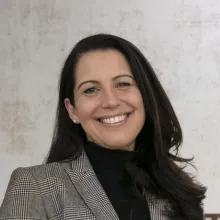Desai and Sklar Elevate Voices of Im/migrant Women in Long-Term Care in New Empirical Study, Highlights Need for Reform in Industry
The first-of-its-kind empirical study uses data collected through qualitative interviews of women who work as long-term care aides in Arizona

Long-term care in the United States is in crisis. The COVID-19 pandemic laid bare the severity of this crisis, shedding light on the avoidable suffering and death that both older Americans and their caregivers experienced due to entrenched industry practices that marginalize long-term care aides, a workforce that is increasingly made up of immigrant and migrant (“im/migrant”) women, and underscored the urgent need for industry reform.
University of Arizona Law Associate Professor of Law Shefali Milczarek-Desai and Faculty Director of the Health Law and Policy Program Tara Sklar’s latest co-authored research, “Immigrant Workers' Voices as Catalysts for Reform in the Long-Term Care Industry," offers insight into the real-life experiences of im/migrant women who work as long-term care aides in the U.S. Using empirical data collected through qualitative interviews, the paper explores and analyzes the failures of state and federal laws and recommends policies to protect long-term care aides and the vulnerable, older, adult population that relies on their caregiving.
“These women’s voices are largely absent from the legal and health law literature surrounding long-term care even though they intimately experience the failings of long-term care in this country, which was on devastating display during the pandemic,” says Desai, who previously directed the Workers’ Rights Clinic. “This paper elevates these women’s voices and, I very much hope, they will contribute to much-needed reform in the long-term care industry not just to benefit marginalized and vulnerable immigrant and migrant workers, but also for all of us who will require long-term care assistance for grandparents, parents, and eventually, ourselves.”
The study is supported by funding from the University of Arizona Hispanic Serving Institute Faculty Seed Grant Program, and uses data collected through qualitative interviews conducted at University of Arizona Law, with student assistance. The paper will be published in the Fall 2023 issue of the Arizona State Law Journal.
The findings indicate that these essential workers consistently face violations of employment and labor laws, struggle to access their rights such as paid sick leave and lack protection against employer retaliation. The study also highlights that the working conditions not only endanger the aides but also compromise patient safety. These failures contribute to poor quality of care, chronic labor shortages, and increased potential for harm in future public health emergencies.
Long-term care in the U.S. is under increasing high demand with significant growth in the older adult population, especially those aged 85 and over, and this is coinciding with a national labor shortage of 355,000 long-term care workers by 2040.
“If nothing changes in the long-term care labor market, then this leads to untenable staff-to-patient ratios and substandard care for long-term care residents. In order to provide high-quality, safe care as we age, something all of us want for ourselves and our loved ones, we need to address the workers’ rights violations experienced by the aides in our research,” says Sklar.
The article makes recommendations for legal and policy changes in both Arizona and across the nation, aiming to address these issues and improve the situation for both the workers and the aging population they serve. This research fills a crucial gap in the understanding of workplace laws and healthcare policies in long-term care settings, coming at a pivotal time when the country’s long-term care industry requires significant changes to avoid a looming catastrophe for older adults.
“The next phase of this qualitative research aims to include the perspectives of owners and managers of assisted living facilities to ensure an understanding of and access to workers’ rights in long-term care,” says Sklar. “We hope to identify barriers administrators may be experiencing in providing education and outreach on workers’ rights that could help reduce the high rates of turnover in this industry. Not only does high turnover result in higher labor costs, quality of care is also harmed by less experienced workers, including increased spread of infectious diseases. By ensuring workers’ voices are heard and integrated with development strategies by long-term care administrators to retain as well as recruit and hire workers, we are building a more resilient and equitable long-term care system.”
This latest paper continues to build upon Desai and Sklar’s collaborative research that highlights the inextricable link between immigrant workers’ rights and care for older adults. Their previous co-authored work includes, “Why nursing home aides exposed to Covid-19 aren't taking sick leave,” and, "The Return of Typhoid Mary? Immigrant Workers in Long-Term Care."
Read more about this research, and access the forthcoming article here.

Shefali Milczarek-Desai is Associate Professor of Law and Co-Chair of the Bacon Immigration Law and Policy Program at the University of Arizona’s James E. Rogers College of Law. She is the recipient of the College of Law’s Distinguished Public Service Scholar Award and a Sustainable Economies Law Center Fellow. Previously, Professor Desai directed the Workers’ Rights Clinic and instructed students in client-centered and cross-cultural lawyering through representation of low-wage im/migrant workers throughout Arizona’s borderlands.
Desai teaches courses in employment and labor law, torts, and seminars on emerging issues at the intersection of migration and labor. Her current scholarship employs critical legal frameworks to analyze im/migrant workers’ access to paid sick leave, elevate the voices of im/migrant women long-term care aides based on original, qualitative research, examine the potential of im/migrant, worker-owned, cooperative business entities, and scrutinize the use of immigration status evidence in tort cases for future lost damages.

Tara Sklar is the Faculty Director of the Health Law & Policy Program and a Distinguished Public Service Scholar at Arizona Law. She also holds appointments as Associate Director of Telehealth Law & Policy at the Arizona Telemedicine Program, College of Medicine-Tucson, and as a Senior Advisor with Innovations in Healthy Aging at the University of Arizona Health Sciences. She currently serves as a subject matter expert on telehealth legal issues with the Southwest Telehealth Resource Center and with the Health Resources and Services Administration in the Office for the Advancement of Telehealth.
Sklar’s teaching and research examine legal, regulatory, and ethical issues that arise in adapting to a diverse aging population, with a particular focus on digital health equity. She works to bridge the gap between healthcare and law, providing ways they can work together to mitigate health disparities and improve patient care for vulnerable populations. She teaches courses on Telehealth Law & Policy and Aging Law & Policy at the University of Arizona.
